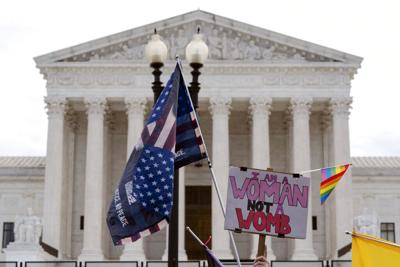It’s been a year since the U.S. Supreme Court reversed Roe v. Wade, upending a half-century precedent and launching Louisiana and other states bent on severely restricting or outlawing abortion into a brave new world of women’s health care.
The results are starting to become clearer, and they’re discouraging, to put it mildly.
In addition to banning elective abortions, Louisiana’s draconian law, like others in states with similar politics, has formed a treacherous landscape for women who miscarry or experience serious problems in their pregnancies — and also for those who treat them, who must now fear criminal prosecution for offering what is often the best, safest and most compassionate care.
Supporters of these laws insist concerns are overblown and that guidelines for ending medically futile pregnancies — not a medical term — are clear enough. But many doctors say the rules are too vague.
Given the inherent privacy rights surrounding health care, it’s hard to quantify how often horror stories happen, but instances of patients going public — women like Nancy Davis of Baton Rouge, who could not get an in-state abortion even though the fetus she was carrying did not develop a skull — hint at broader suffering behind closed doors. So does a report from researchers at the University of California at San Francisco, which documented 50 examples across the country of health complications resulting from abortion bans.
That’s horrible for the patients involved, of course. It’s also hard on the providers.
The 19th, a nonprofit news organization that covers gender and public policy, recently recounted a decision by a maternal-fetal medicine specialist in Houston to leave the state due to Texas’ ban on abortions after six weeks, which was enacted before the Dobbs decision overturned Roe. Alireza Shamshirsaz told the story of a patient who was 15 weeks pregnant with twins, only to see things go horribly wrong. He knew she would not deliver a live baby, but because her life was not in immediate danger, there was nothing he could do other than send her home.
When she returned to the hospital days later, “she had developed septic shock, a condition that involves extremely low blood pressure, mental confusion and, in some cases, organ failure and death. They cared for her in the intensive care unit for two weeks,” the story said. “Shamshirsaz said the infection was so severe that the patient’s kidneys suffered permanent damage. She would require an organ transplant within a year or so to stay alive.”
All of this, Shamshirsaz knew, could have been avoided if the patient had been able to get an abortion when she came in the first time. That realization was too much for him, and he decamped for Boston before the high court even ruled, leaving women in Texas one fewer specialist to care for them during traumatic times.
Again, it’s hard to know how common stories like this are, but some data is emerging.
A national poll of OB-GYNs by the Kaiser Family Foundation paints a frightening picture.
It found that 20% — but 40% of those in states where abortion is banned — feel their ability to treat miscarriages and pregnancy-related medical emergencies is constrained. Over half of doctors in states with abortion bans said they are less able to practice within the standard of care than before the Dobbs decision last year. Nationwide, substantial majorities said restrictive laws have worsened pregnancy-related mortality — already a crisis in Louisiana — as well as racial and ethnic inequities and the ability to attract new OB-GYNs to the field.
Yet another analysis has documented a drop in applications to OB-GYN residency programs overall, and a steeper falloff in states with strict abortion laws.
Closer to home, when I went in for my annual check-up earlier this year, my doctor brought up the bullying letter that attorney general and gubernatorial candidate Jeff Landry sent the Louisiana State Medical Society soon after the ruling, emphasizing doctors’ potential criminal exposure, which the Louisiana Legislature has since declined to reconsider.
That’s just not normal.
And the fact that it all appears to be very much on doctors’ minds should be terrifying. If doctors here decide to pack it in, or avoid going into OB-GYN or practicing in Louisiana in the first place, think of where that could leave Louisiana women, at what are likely to be some of the worst moments of their lives.

